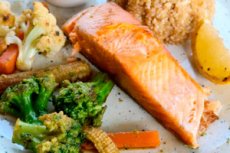New publications
Antioxidants fight female reproductive system problems caused by a high-fat diet
Last reviewed: 02.07.2025

All iLive content is medically reviewed or fact checked to ensure as much factual accuracy as possible.
We have strict sourcing guidelines and only link to reputable media sites, academic research institutions and, whenever possible, medically peer reviewed studies. Note that the numbers in parentheses ([1], [2], etc.) are clickable links to these studies.
If you feel that any of our content is inaccurate, out-of-date, or otherwise questionable, please select it and press Ctrl + Enter.

In a systematic review published in the journal Frontiers in Nutrition, researchers from Italy presented a comprehensive overview of the effects of biological matrices with antioxidant properties on mitigating high-fat diet-induced complications of the female reproductive system.
High-calorie diets, including those rich in saturated and trans fats, can negatively impact the female reproductive system by causing the production of reactive oxygen species (ROS) and, as a result, inducing oxidative stress. This can lead to irregular ovulation cycles and premature ovarian failure.
Diet-induced ROS production may affect the blood supply to the reproductive organs and disrupt the hypothalamic-pituitary-ovarian axis. These processes may cause hormonal imbalance, induce insulin resistance and hyperleptinemia, promote chronic low-grade inflammation, affect oocyte quality, and impair embryo implantation in the uterus and maintenance of pregnancy.
Biological matrices that may positively affect the female reproductive system include carbocyclic sugars, phytonutrients, organosulfur compounds, hormones, neuropeptides, organic acids, and vitamins. These matrices mainly contain a variety of antioxidants that help reduce ROS-induced oxidative damage.
In this systematic review, the authors assessed the effectiveness of biological matrices in preventing ovarian complications caused by high-fat diet-induced oxidative stress. They analyzed 121 studies published in peer-reviewed English-language journals.
Antioxidants derived from biological matrices and their effects on high-fat diet-induced oxidative stress
Folliculogenesis is the process of maturation of primordial germ cells into oocytes within follicles and is vital for the optimal functioning of the female reproductive system.
A high-fat diet can cause oxidative damage to the ovaries, specifically affecting follicle development, survival, and the production of hormones needed to regulate folliculogenesis. These factors can affect oocyte quality and disrupt embryo development.
In rodent models of high-fat diet-induced oxidative stress, a diet containing a combination of two phytonutrients, barley and dates, preserved ovarian follicles, increased their development and proliferation, restored ovarian stroma, and increased levels of endogenous enzymatic antioxidants.
These positive results may be explained by the increased activity of flavonoids and phenolic antioxidant properties contained in ferulic acid, kaempferol, malvidin, caffeic acid and quercetin derivatives.
In high-fat diet-induced oxidative stress mouse models, a thymoquinone-containing diet activated the AMPK/PGC1α/SIRT1 pathway, increasing antioxidant status, reducing inflammation, and improving mitochondrial function. These changes were associated with increased early follicle numbers and improved oocyte quality.
A diet containing the neuropeptide phoenixin reduced ovarian weight, reduced periovarian fat pads, modulated luteinizing hormone (LH) receptor positivity in rodents, and reduced ovarian apoptosis and inflammation in rodents fed a high-fat diet.
In obese rats, a multi-antioxidant supplement containing an organosulfur compound, phytonutrients, vitamin E, and coenzyme Q10 reduced ovarian inflammation and follicular atresia and alleviated obesity-induced infertility.
In rats fed a high-fat diet, a diet containing apple cider vinegar and phoenixin restored hormonal balance, increased folliculogenesis, and improved the antioxidant response in the ovaries.
A diet containing ferulic acid, kaempferol, malvidin, caffeic acid and quercetin derivatives increased the levels of both enzymatic and non-enzymatic antioxidants in high-fat diet-fed rats, resulting in protection of oocytes from DNA damage.
Similarly, MitoQ10 supplementation reduced high-fat diet-induced oxidative stress and improved mitochondrial function, mitigated DNA damage, and preserved oocyte quality.
Organosulfur compounds have shown efficacy in ameliorating high-fat diet-induced obesity-induced infertility. Dietary interventions containing ferulic acid, kaempferol, malvidin, caffeic acid, and quercetin derivatives, as well as the combined use of myo-inositol and α-lipoic acid, have shown efficacy in protecting against ovarian cycle disorders and reducing oxidative stress-induced ovarian degenerative changes.
Overall, the existing literature indicates that biological matrices as antioxidants can effectively reduce the number of atretic follicles, inflammation and ovarian apoptosis. This is supported by the reduction in ovarian weight, reduction in periovarian fat pads and modulation of LH receptor positivity.
Clinical significance of biological matrices as antioxidants
Assisted reproductive technologies are considered a traditional method of treating infertility. However, this method cannot effectively eliminate the main causes of infertility associated with a high-fat diet. Biological matrices as antioxidants have shown promising results in treating these problems.
Omega-3 fatty acids and vitamin B12 have been shown to be effective in reducing symptoms of endometriosis, a chronic hormone-related inflammatory disease affecting women of reproductive age.
Results from randomized controlled clinical trials highlight the effectiveness of vitamins E and C in reducing pelvic pain and inflammatory markers in peritoneal fluid.
Biological matrices including vitamin A, vitamin B1, vitamin B6, vitamin B12, vitamin C, vitamin D3, vitamin E, niacinamide and folic acid have been shown to be effective in improving pregnancy rates in women with polycystic ovary syndrome (PCOS).
Treatment with resveratrol in patients with PCOS has been shown to improve oocyte and embryo quality. Similarly, treatment with vitamins D and E has been shown to increase implantation rates and overall pregnancy success, respectively.
